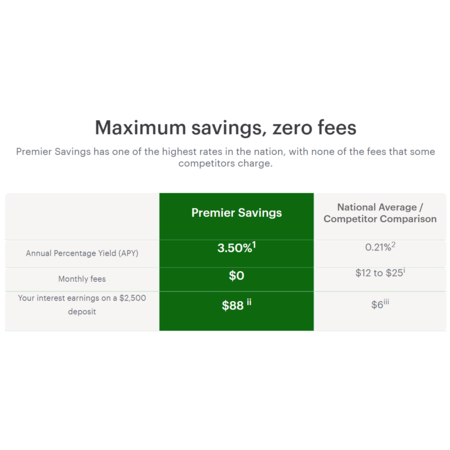- MySavingsDirect (Emigrant Bank) [mysavingsdirect.com] - 4.35%
- Merchants Bank of Indiana [merchantsbankofindiana.com] - 4.34%
- Bask Bank [baskbank.com] - 4.25%
- UFB Direct [ufbdirect.com] - 4.21%
- Upgrade Premier [upgrade.com] - 4.13%
- Salem Five Direct [salemfivedirect.com] - 4.10%
- Capital One 360 Savings [capitalone.com] - 3.4%
- Robinhood Gold [robinhood.com] - 3.75% w/ $5/mo membership (Can't verify)
This post can be edited by most users to provide up-to-date information about developments of this thread based on user responses, and user findings. Feel free to add, change or remove information shown here as it becomes available. This includes new coupons, rebates, ideas, thread summary, and similar items.


Leave a Comment
Top Comments
The point I'm making is, if the Fed meets expectations (currently 50bps-50bps-25bps-pause) over the next 4 meetings, the rates will theoretically stay where they are.
To use a real-world example, it's the same reason why mortgage rates have been rising gradually and why they didn't suddenly rise 75bps yesterday or today upon the Fed hike announcement. It's because it was already priced in.
Edit: Note, I'm leaving quite a bit of nuance and detail out of this and am not picking on you in particular. I just see quite a bit of misunderstanding about how consumer interest rate products react to Fed overnight rate hikes and when.
Source: Work in finance
351 Comments
Sign up for a Slickdeals account to remove this ad.
3 month treasuries are above 4% now. 2 year CDs will pay 5%. There's a really narrow niche of people who are well served by choosing a savings account over a CD or a treasury right now.
DollarSavingsDirect.com
My Ally savings account just went up to 2.5%. They're increasing it like every two weeks. Insane.
Ally has lagged for years on interest rate increases but super fast to lower them and not tell you. Crappy place.
Our community has rated this post as helpful. If you agree, why not thank TurtlePerson2
Sign up for a Slickdeals account to remove this ad.
Is the YTM number the interest rate, basically on the T-bill?
Is the YTM number the interest rate, basically on the T-bill?
T-Bills don't pay interest. Instead they're sold for less than face value. e.g. 1 year T-bill sells for $97 and will be worth $100 at maturity. Note that that different ($100-$97=$3) counts as interest when the T-bill matures, for the purposes of taxes.
Personally, I've only ever bought treasuries at auction once. I think the secondary market is way easier to use and I'm not aware of any advantage gained by going the auction route. You'll see on the secondary market that treasury notes and treasury bills are mixed together.
T-Bills don't pay interest. Instead they're sold for less than face value. e.g. 1 year T-bill sells for $97 and will be worth $100 at maturity. Note that that different ($100-$97=$3) counts as interest when the T-bill matures, for the purposes of taxes.
Personally, I've only ever bought treasuries at auction once. I think the secondary market is way easier to use and I'm not aware of any advantage gained by going the auction route. You'll see on the secondary market that treasury notes and treasury bills are mixed together.
Also, investopedia says "The interest income from T-bills is exempt from state and local income taxes. However, the interest income is subject to federal income tax. "
Sign up for a Slickdeals account to remove this ad.
Leave a Comment